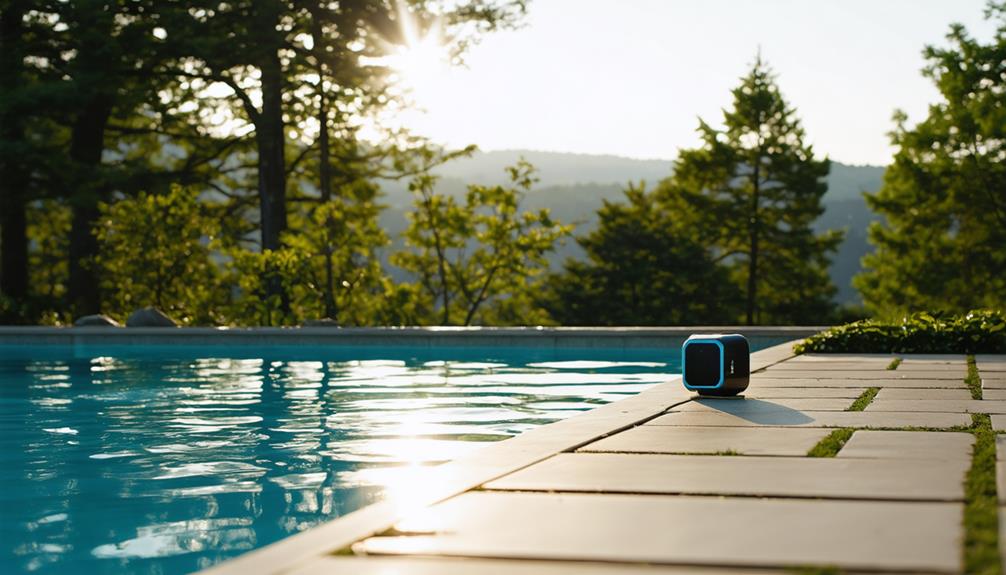
Brainstorm Security Shop

For Orders Over $99

On Any Of Our Products

Details On Refund Page

In the realm of pool safety, swimming pool alarms for inground pools have emerged as indispensable guardians, offering a vital layer of protection against potential mishaps. With a variety of models such as surface wave, subsurface wave, and wireless alarms available, selecting the right system can be a complex endeavor. These devices promise not only peace of mind but also compliance with safety regulations. Yet, what truly sets one type apart from another, and how do these features translate into real-world effectiveness? Understanding these nuances is crucial for any pool owner committed to safeguarding their oasis.
When considering the safety of inground pools, understanding the variety of pool alarms available is crucial. Pool alarms serve as an essential line of defense against accidental drownings, providing a necessary alert system to homeowners and caretakers.
Among the different types of pool alarms, wireless alarms have gained popularity due to their ease of installation and flexibility. Unlike traditional wired systems, wireless alarms can be placed at various points around the pool area without the need for extensive wiring, thus offering a more versatile safety solution.
Different types of pool alarms cater to specific needs and safety regulations. Surface wave alarms detect disturbances on the pool’s surface, which can indicate a child or pet entering the water.
Subsurface wave alarms, on the other hand, monitor changes below the surface, offering a more sensitive detection method for any unexpected entry. Perimeter alarms create an invisible boundary around the pool, alerting users when someone crosses the threshold.
All these alarms must comply with local safety regulations, which often mandate specific features and sensitivity levels to ensure adequate protection. Understanding these types and their compliance with safety standards is essential to selecting the most appropriate system for a given setting.
Pool alarms offer several significant benefits, enhancing the safety and security of inground pools. One of the primary advantages is their role as an effective safety measure, contributing to drowning prevention. By alerting pool owners to unauthorized access or unexpected water disturbances, pool alarms act as an early warning system, providing crucial time to respond to potential emergencies. This proactive approach is essential in safeguarding lives, especially for households with young children or pets.
Furthermore, pool alarms serve as a deterrent to unauthorized use, ensuring that the pool area remains secure. When strategically integrated with other security measures, such as fences and covers, they provide a comprehensive safety net. Below is a table summarizing the benefits of pool alarms:
| Benefit | Description | Impact |
|---|---|---|
| Safety Measures | Implemented as part of a broader security strategy | Enhances overall pool safety |
| Drowning Prevention | Alerts owners to unauthorized access or disturbances | Reduces risk of accidents |
| Unauthorized Use Deterrent | Discourages unsupervised entry into the pool area | Enhances security |
| Proactive Emergency Response | Provides early alerts for timely intervention | Increases response effectiveness |
Having explored the benefits of pool alarms, it is important to understand the key features that should be considered when selecting the right alarm for an inground pool.
Pool safety is paramount, and choosing an alarm system that effectively meets your needs requires an evaluation of several critical components. First, consider the type of alarm technology utilized. Different alarms may use surface wave detection, infrared beams, or subsurface disturbance sensors; each offering varying levels of sensitivity and reliability. The selection should align with the specific characteristics and risk factors of your pool environment.
Sound clarity and volume are crucial for ensuring prompt alert responses. An alarm should emit a sound that is loud and distinct enough to be heard from a considerable distance, as this can provide timely alerts to potential dangers.
Additionally, the alarm system’s integration with smart home devices can enhance pool safety by enabling remote monitoring and control. Battery life and power source are also significant considerations, as a reliable power supply ensures continuous operation without interruption.
Installing a swimming pool alarm for an inground pool requires careful planning and attention to detail to ensure optimal functionality and safety. It is crucial to consider the compatibility of the alarm system with your pool’s design and dimensions. Wireless options are particularly popular, offering flexibility in placement without the need for extensive wiring. Before installation, verify that the chosen alarm complies with local safety regulations, as these can vary significantly across different jurisdictions.
Proper positioning of the alarm sensor is vital for detecting any unauthorized access or accidental falls into the pool. Ensure that the device is securely mounted and calibrated to the correct sensitivity setting to minimize false alarms while maintaining effectiveness. The following table illustrates the critical emotional benefits of a well-installed pool alarm:
| Feature | Emotional Impact |
|---|---|
| Wireless Options | Freedom and Flexibility |
| Compliance with Safety Regulations | Peace of Mind |
| Secure Installation | Enhanced Safety |
To further ensure a seamless installation process, consult the manufacturer’s guidelines and consider seeking assistance from a professional installer who is familiar with both the technical aspects and legal requirements. Taking these steps will provide both security and peace of mind for pool owners and their families.
Regular maintenance and care of swimming pool alarms are essential for ensuring their long-term reliability and effectiveness. These devices serve as a critical safety feature, and their performance can be compromised if not properly maintained. A crucial aspect of upkeep involves integrating the alarm system within your regular pool cleaning routine.
Debris and dirt accumulation can interfere with the sensor’s functionality, leading to false alarms or, worse, failure to detect real emergencies. Therefore, ensuring that the alarm’s components are free from obstruction is paramount.
Additionally, maintaining proper water chemistry is vital not only for pool hygiene but also for the optimal operation of pool alarms. Imbalanced water chemistry can lead to corrosion or mineral deposits on the alarm’s hardware, affecting its sensitivity and accuracy.
Regularly testing and adjusting the pool’s pH, alkalinity, and calcium hardness levels can prevent such issues.
It is also advisable to periodically test the alarm system itself, following the manufacturer’s guidelines to ensure each component functions correctly.
Detection technology in pool alarms identifies unauthorized access by sensing water disturbances or perimeter breaches. These systems comply with safety regulations, ensuring timely alerts to prevent accidents and enhance security around aquatic environments.
Saltwater compatibility is a crucial consideration for alarm installation in pools. Most modern swimming pool alarms are designed to function effectively in saltwater environments, ensuring reliable detection of unauthorized access while maintaining performance standards in diverse aquatic conditions.
Yes, pool alarms can be integrated with smart home systems, offering smart alarm features such as real-time alerts and remote monitoring. Integration benefits include enhanced safety, convenience, and control, thereby improving overall pool management and security.
The typical lifespan of a pool alarm varies, often ranging from 3 to 5 years. Ensuring optimal performance requires regular alarm maintenance. Tips include periodic testing and replacing batteries, as alarm battery life significantly impacts functionality.
Yes, there are pet-friendly options available in pool alarms, specifically designed to enhance pet safety. These alarms often feature sensitive sensors and adjustable alarm features to detect even small disturbances, ensuring comprehensive protection for pets.
Brainstorm Security Shop
1867 Caravan Trail
Ste 105
Jacksonville, FL 32216
Call us toll free: (800) 859-5566